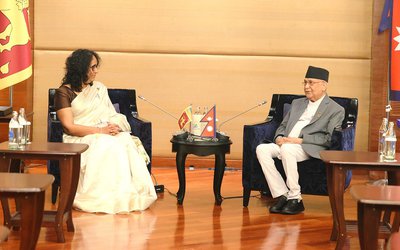
Andolan season" seems to be back in Nepal. As Khil Raj Regmi was taking oath of office as chairperson of the proposed 11-member electoral cabinet on Thursday, supporters of 22 political parties opposing an incumbent chief justice as the chief of the executive were clashing with the police outside the president's office. Regmi's only solace was congratulatory messages from the US, UK, India, China and the wider international community, wishing him success in holding elections to the constituent assembly by June 21, a deadline agreed upon by the four major parties.
Still, holding elections and institutionalising democracy appear very difficult for Regmi's government. The odds weigh heavily against him. The four big parties and their leadership supporting Regmi are thoroughly discredited — evident from the fact that they couldn't offer a political alternative to Baburam Bhattarai. The other 22 parties have already hit the streets, demanding either Regmi's exit or his resignation as CJ. Moreover, Regmi faces an intense legal battle as there are half-a-dozen cases pending before the Supreme Court, some challenging his appointment as PM on the ground that it's in violation of the principle of separation of powers. At least two cases challenge the way President Ram Baran Yadav amended 25 different clauses of the interim constitution at one stroke, exercising a special constitutional provision expected to be used sparingly.
Regmi decided on the composition of the bench to hear some of these cases and, much against his earlier promise, took oath as the executive chief, even when the case was sub-judice. "This is a black day in the history of Nepal's independent judiciary and democracy," said Anup Raj Sharma, a former SC chief justice. The International Commission of Jurists asked Regmi to at least resign as CJ to ensure judicial independence. The Nepal Bar Association was more stridently critical. In brief, the hope expressed by the international community didn't confirm to the visible and latent despair in the country. And there are fears that the CJ, one more guinea pig in the political experiment over the last eight years, will deliver no miracle, nor even the minimum stability and political order required.
Regmi meticulously and quietly negotiated his terms with top leaders of the four parties for nearly a month but discredited the judiciary in the process. How can a sitting CJ bargain for power and position? Nepal's SC, like most other state institutions, is getting depleted, with just six judges left of 15 and with no provision to fill the vacant posts. But with Regmi's deal with politicians, it's the credibility of the apex court that's now at stake. In a country that suffers from an institutional vacuum, erosion of the apex judiciary's credibility may lead to lawlessness that will have a direct bearing on public security. This may also invite increased interference from outside.
Votaries of the CJ-as-PM abound in Nepal, and they often cite the example of other countries, including Bhutan and Bangladesh. But they overlook the fact that Nepal's interim constitution expressly forbids a CJ or a judge occupying an elective post. Moreover, leaders of the big four parties have not taken responsibility for their failure. Instead, they apparently hope that the CJ-led government's inevitable inability to hold elections within 100 days will show Regmi as the ultimate failure, and not the political parties.
The new cabinet consisting of 11 bureaucrats faces other practical challenges. There are big posters and open pressure to arrest forthwith Balkrishna Dhungel, a former legislator and Maoist leader convicted on a murder charge. Similarly, pressure mounts on reviewing some of the major decisions of the Bhattarai-led government, involving huge financial irregularities and corruption. Can Regmi afford to go that far and displease his predecessor and the Maoist party? He has refused to resign as CJ, albeit with a promise to not interfere in the SC's day-to-day affairs. But he cannot remain indifferent to so many irregularities committed by politicians, especially those supporting him, while in government. Regmi may have fulfilled his ambition to be PM, but the chances of his succeeding, in the unbroken series of failures that is Nepal's political exercise, are remote.
(Courtesy: The Indian Express)

Yubaraj Ghimire
Ghimire is a Kathmandu based journalist.
- Manmohan Singh And The Churn In Nepal
- Jan 08, 2025
- Why ‘Revolutionary’ Communist PM Prachanda Went To Temples In India
- Jun 08, 2023
- Why China Is Happy With Nepal’s New PM
- Jan 03, 2023
- Prachanda Sworn In As PM: New Tie-ups In Nepal, Concern In India
- Dec 27, 2022
- Young TV Anchor As Its Face, RSP Rise Takes Nepal By Surprise
- Nov 23, 2022














